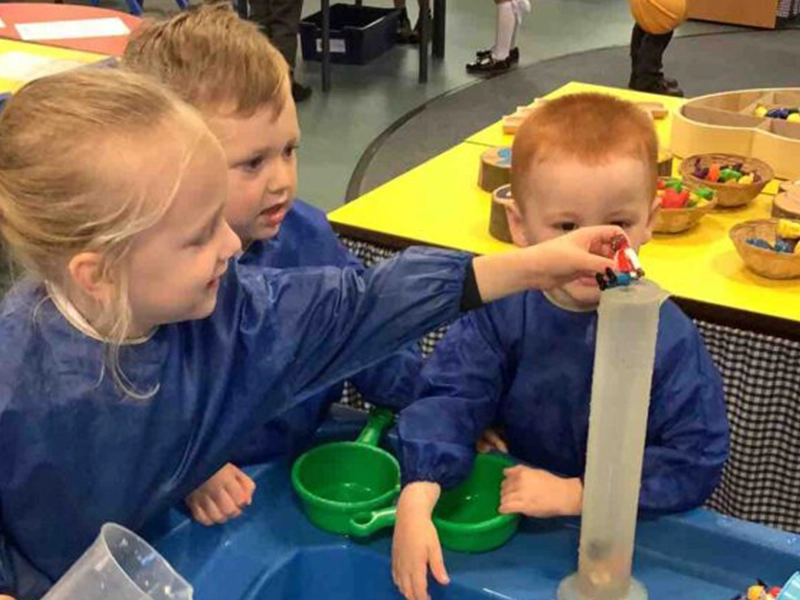Early Years and Foundation Stage
Welcome to the EYFS
Our Early Years Foundation Stage is the starting point of a child’s journey in school. Children in our setting range from the age of three up to five. This section of the website will share the curriculum (the planned learning) for children in our Nursery and Reception classes. We hope that you find this information helpful. Please see the admissions section for details on applying for a nursery/ school place or the new starters section for useful information.
Kind regards, Miss Follan (EYFS Leader)
School Tour
At Nunthorpe Primary we see our youngest learners as unique individuals who join our school community with a wealth of personal experiences.
We value the unique contribution each family brings to our school community and teach our learners to respect and value differences by sharing and celebrating diversity. Our intention is to ensure each child and family are enabled to feel confident to share and express themselves in a supportive, nurturing environment. Our early years curriculum has been carefully designed to facilitate an aspirational, language rich and creative learning environment rooted in respectful relationships to help our children reach their potential.
Learning experiences are carefully tailored to meet the needs of each individual, ensuring children have the right opportunities to master the core skills vital to prepare them for the Key Stage One curriculum. The setting is stimulating and continuously evolving to reflect the changing needs of our pupils. Personalised learning is shared digitally with parents so that they can help reinforce learning at home.
Children are supported to develop the emotional resilience needed to persevere when tasks are challenging. Our learning culture values effort and perseverance. Our provision is mindful that young learners need to revisit core skills many times in different ways to achieve mastery. Our children leave EYFS seeing themselves as skilled, independent and capable learners ready for the next phase of learning.


Your child will follow the Early Years Foundation Stage curriculum. There are seven areas of learning and development in the EYFS curriculum.
Three areas are essential for building a strong base to build on and form a crucial part of our teaching and learning. These three areas, the prime areas, are:
- Communication and Language
- Physical Development
- Personal, Social and Emotional Development
We also plan for children’s learning in four specific areas. (The prime areas are continuously developed through the specific areas.
The specific areas are:
- Literacy
- Mathematics
- Understanding the World
- Expressive Arts and Design
How we teach in EYFS

In EYFS children learn through a range of child-initiated play experiences and through adult directed activities both in and outdoors.
Children are supported to be active in their learning, develop resilience and critical thinking through first hand experiences.
We understand that books and storytelling experiences provide children with opportunities to develop listening, attention, imagination, language and creativity.
We have carefully developed our topics around a range of quality reading texts, both fiction and non-fiction to scaffold learning.
Alongside this music, arts and physical activities ensure that children have opportunities to develop their knowledge and understanding of the world. This is key to children’s daily provision in the setting.
We follow a phonics scheme called Read, Write, Inc and a maths scheme called Mastering the Curriculum. This helps us to ensure that learning is carefully managed and that children are well-prepared for the next phase of their learning by the end of the Reception year.
We also work alongside professionals such as the dental team to ensure that children’s health is promoted throughout their journey in EYFS.
The children in Reception work with our music specialist Mrs Norris and also our yoga teacher Miss Close, this allows them to learn with specialists who are talented and passionate in these key areas.


We have links with the local community and have visits from the fire service, police and our local woodland officers. Wherever possible, we go into our community to visit the woodland, local farms, theatre and immediate community to help children enrich experiences outside the classroom.
Parents and care givers are invited in to school during the autumn term when staff discuss the importance of early reading and what this looks like at each stage. Phonics is also covered in these sessions and staff model what we do with the children and provide the parents with a copy of the sounds and the rhymes which accompany them. We also invite families into our setting in the autumn and spring term to take part in topic themed workshops. Working in partnership between home and school is a key focus for the Early Years team. Keeping families informed of planned learning and achievements is done through sharing of newsletters, Evidence Me personal emails, reading diaries and parent consultations.
Impact
This is how we measure the effectiveness of our teaching and learning. From the point of starting school, we monitor and assess the progress of each learner in the key areas outlined above. When children achieve the national good level of development (GLD) at the end of the Reception year they are considered well prepared for the next phase of their learning and can access the National Curriculum from the beginning of Year One.
Through careful monitoring during EYFS we can plan and provide appropriate support and intervention for children who need additional support in a key area/s to help them close gaps in learning. We work alongside parents and caregivers, speech therapists and SEND professionals to identify need and support for children with additional needs. We run an intervention programme called BLAST across both classrooms to support language and communication development. We also support gross and fine motor skills with Squiggle Whilst You Wiggle and also pencil grip and cutting skills. Phonics, number and early reading skills are part of our regular intervention support.

We pride ourselves on ensuring that every child, regardless of their starting point, disadvantage or SEND receive the best support possible to make progress through targeted support. Children in EYFS are encouraged to see themselves as capable, independent and valued for their effort.
Click the buttons below to view our EYFS Curriculum…
Long Term Plans
Nursery Termly Plans
Reception Termly Plans
Reading in Early Years
From nursery, children share a book 1:1 at least once a week with a member of the EYFS team and a home loan scheme is in place allowing children to take a book home to share. First letters from Read, Write Inc are sent home along with CVC words when appropriate. Pupils in Reception and Year 1 read books matched to phonic ability at home and school and take-home phonics linked letters, sounds and/or words as appropriate. Click here for more information about Read, Write Inc.
In Foundation Stage, parents are invited in to school during the autumn term when staff discuss the importance of early reading and what this looks like at each stage. Phonics is also covered in these sessions and staff model what we do with the children and provide the parents with a copy of the sounds and the rhymes which accompany them. After this, 1:1 coaching meetings are offered if staff believe it would appropriate for some children.
Our Early Years Reading Spines…
The rhymes used in our Early Years…

Contact Information
Nunthorpe Primary Academy
Swans Corner
Guisborough Road
Nunthorpe
Middlesbrough
TS7 0LA
Tel: 01642 315508
Email: enquiries@nunthorpeprimary.org.uk

Key Staff Members
Head of School:
Mr Salter
Reception Class teacher:
Miss Follan and Miss Close
Nursery teacher:
Miss Tripp and Miss Topliffe
Teaching Assistants:
Miss Evans, Miss Hill, Mrs Myers
School Office:
Mrs Dent, Mrs Saunders and Mrs West




